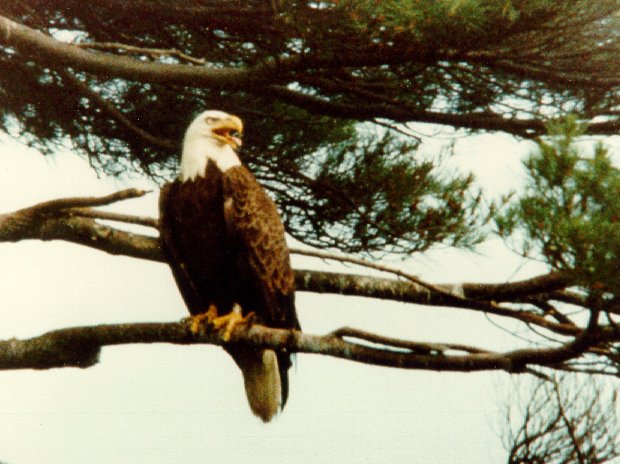
 |
||
|
|

Photo © Nancy Yeatts Bald eagle at Lake Assawompsett watching for prey. |
The eagle's eyesight is especially remarkable. With vision about five times sharper than our own, an eagle can spot a target as small as a rabbit up to a mile away. In addition, an eagle has excellent depth perception due to the overlap, of the right and left fields of vision. |
| The talons,or claws on an eagle's toes are curved and razor-sharp for catching and holding their prey. This gave eagles the name raptor which comes from a Latin word "rapere" meaning to grip or grasp. Rough bumps on the eagle's toes also help them hold slippery, wiggling fish. A raptor's feet are important to capturing food and also as a method of protection. | 
Photo
© Nancy Yeatts
|
The long talons and vise-like grip can inflict serious wounds to intruders. Their diet consists mainly of fish, but waterfowl, small mammals and even turtle remains have been found in their nests. To catch fish, eagles generally watch the water surface from a perch or while soaring in the air. Then they swoop down close to the water and drop their feet right in the water to catch the fish. Eagles often steal food from other eagles or from other birds of prey like ospreys. They also eat carrion, the decaying flesh of dead animals, such as a deer hit by a car. Carrion is especially important in winter when other foods are not easily found.
Eagles are "birds of prey," which means they hunt for their food. Unlike other birds, which eat seeds or insects and travel only short distances in search of a meal, the eagle must often fly great distances in order to find worthy fare. In order to do this without expending the inordinate amounts of energy that flapping flight would require; the eagle has become a master of soaring. Riding upon vertically spiraling columns of warm air called thermals, the eagle can travel up to twenty miles per hour virtually without effort.
The eagle is further aided in flight because its bones are hollow. Unbelievably, the total weight of an eagle skeletal system is only half the weight of its feathers! With a wingspan of seven to eight feet and a wide and rudder-like tail, the eagle was built to master the skies.